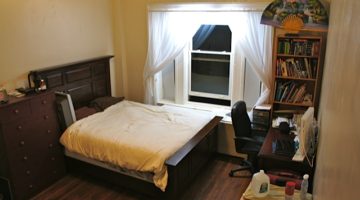City of Refuge
AT 10 on a blustery night a few weeks ago, a slightly built 44-year-old Orthodox Jew named Isaac Schonfeld trudged to the top floor of the Millinery Center Synagogue.
Between Two Worlds
The synagogue, a three-story building on the Avenue of the Americas in the garment district, was opened in 1948 by a congregation of dressmakers and hatters. Their names, an assortment that is heavy on Sadies, Irvings, Berthas and Bernards, are recalled on memorial plaques inside the sanctuary.
Although the synagogue still operates as a house of worship, the sanctuary these days is in disarray. Shabby books are piled on worn wooden benches, and stains dot the faded burgundy carpet. A Con Ed bill from November for $1,309.39 is taped forlornly to a wall.
But this evening the place would not lack life.
As Mr. Schonfeld climbed the stairs, he was carrying a steaming 18-quart pot containing the traditional Sabbath stew known as chulent. Chulent is also the name given to the informal weekly gatherings for Orthodox Jews on the margins of their close-knit society that Mr. Schonfeld, a business consultant from Borough Park, Brooklyn, has been holding in the synagogue for the past year. Setting down his homemade bean stew, he adjusted a little electric heater and began greeting the first of the hundred or so people who would soon stream through the door.
A great majority of rigorously Orthodox Jews would have no interest in such a gathering. But for the small percentage who question aspects of their religion, and yearn to form a community of their own, events like Chulent are increasingly common in New York. As the secular world exerts an ever more powerful pull, a growing array of tools








